It takes something special to win the MotoGP World Championship. It takes something extraordinary to get six of them and clinch the latest in the fashion Marc Marquez did in 2019.
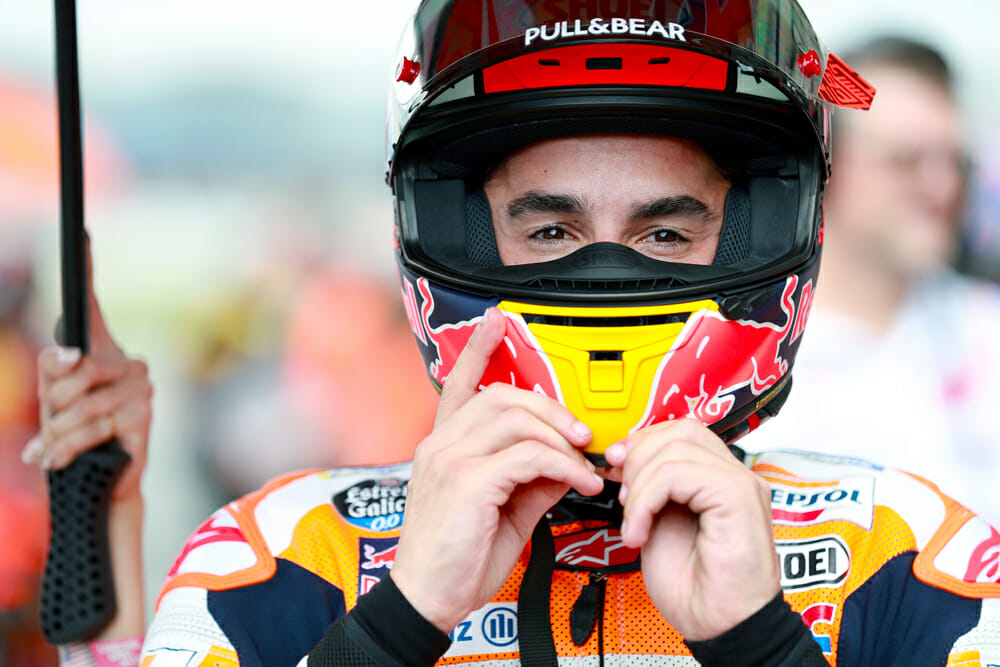
By Michael Scott
Photography by Gold & Goose
It goes without saying that racing at the highest level is intensely demanding. Massive gifts are a burden as well as fulfillment; the contest—week in week out over a record 19 rounds—an exhausting effort. This is what makes it worthwhile, and what makes great champions great, for there are many who fall by the wayside.
Few carry this burden of willpower and talent as lightly as eight-time World Champion, Marc Marquez. His outwardly casual approach is part of the formidable armory of the latest in a series of serial champions.
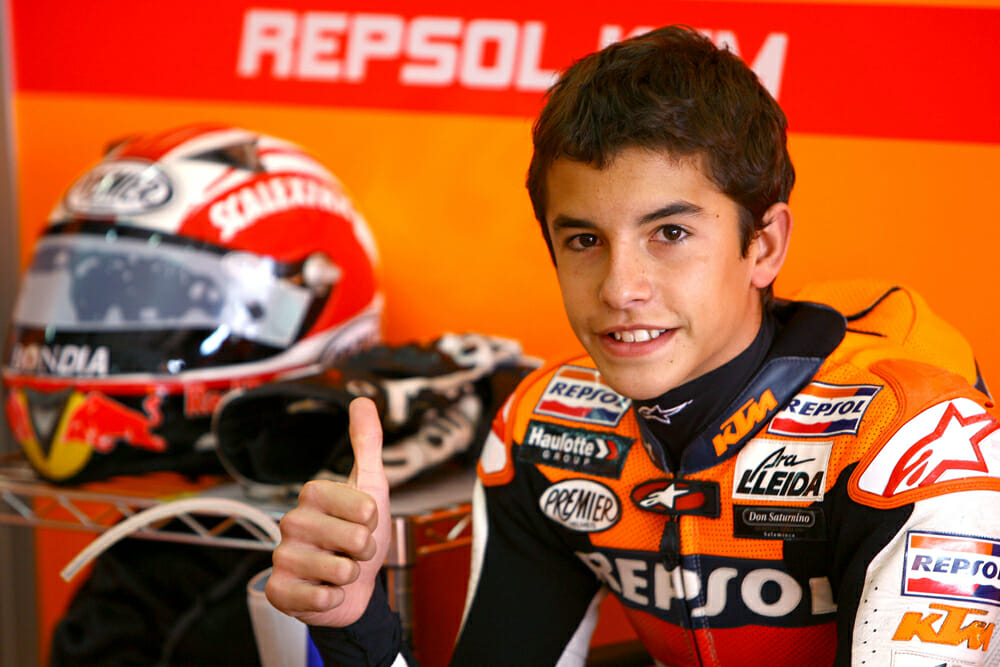
Serial winners are a hallmark of motorcycle GP racing. More have reigned supreme for a spell than otherwise. Out of 26 champions over 71 years, there are only 10 one-offs: Les Graham, Libero Liberati, Gary Hocking, Marco Lucchinelli, Franco Uncini, Wayne Gardner, Kevin Schwantz, Alex Criville, Kenny Roberts Jr., and Nicky Hayden.
More common are those who have won it again and again. The most prolonged uninterrupted spell—seven years—belonging to Giacomo Agostini. Next is Mick Doohan and Valentino Rossi, with five in a row. These are just three among those who have taken three titles or more, including in recent years Kenny Roberts, Eddie Lawson, Wayne Rainey and Jorge Lorenzo.
Marquez’s fourth in succession, the sixth in seven MotoGP years, puts him high on the list, with no sign of any pause to come. Even a second successive bout of shoulder surgery (right shoulder this time, left shoulder December 2018) is just another show of strength. The damage was sustained in two heavy crashes in rounds 15 and 18, in Thailand and Malaysia. But Marc showed no outward signs and won not only in Thailand but three of the next four races, then ran four days of testing. Only when that was over did he admit he was hurt, and go for remedial surgery.
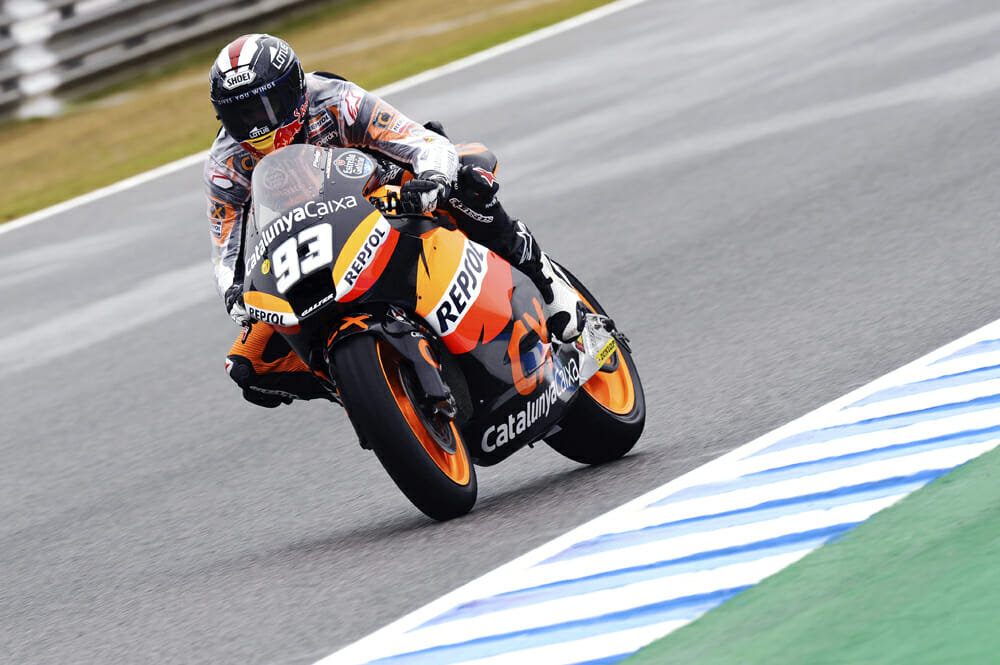
The same invincibility applied on track. On a factory Repsol Honda that had closed the gap to Ducati’s top speed advantage, he was able to ride in a more measured way. “I didn’t have to risk so much in the braking,” he said. When he could win, he did. On every other occasion, but for an electronically triggered slip-off in Texas, he came second.
He frequently spoke of this matured approach: going for the title rather than race wins, accepting that at some tracks, other bikes might work better. Marquez’s way of accepting second happened six times in 19 races. Four of them were by less than a second, and three of those by less than a 10th of a second.
He was formidable.
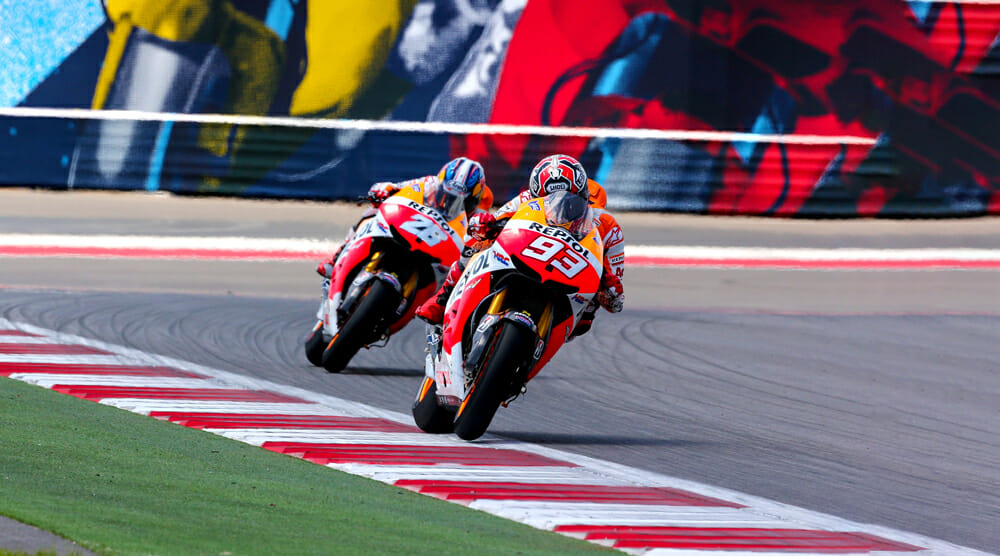
Still only 26, Marc’s results moved him up among the pantheon of superstars. Only Giacomo Agostini (eight) and Valentino Rossi (seven) have won more premier-class championships, and he has set many youngest-ever records since his first MotoGP title as a rookie in 2013; among them the youngest to claim six premier-class titles. Traditionalists will appreciate, though, that he missed out being the youngest to take four in a row. Mike Hailwood was 25 when he took his fourth straight in 1965.
For Marc, racing started at age 5, in enduros. Father Julia was a motorcycle rider rather than a racing fan, though he did motocross marshaling duty. The impetus came from the boy. “He said, ‘I want a motorbike.’ And our life changed.”
By the age of 7, he was motocrossing, aged 8, he was Catalan champion. At 10, he began to focus on road racing, and by 12 had formed a crucial relationship with former 125cc World Champion Emilio Alzamora, who was building a racing empire running from the selection and development of riders to the training of technicians.
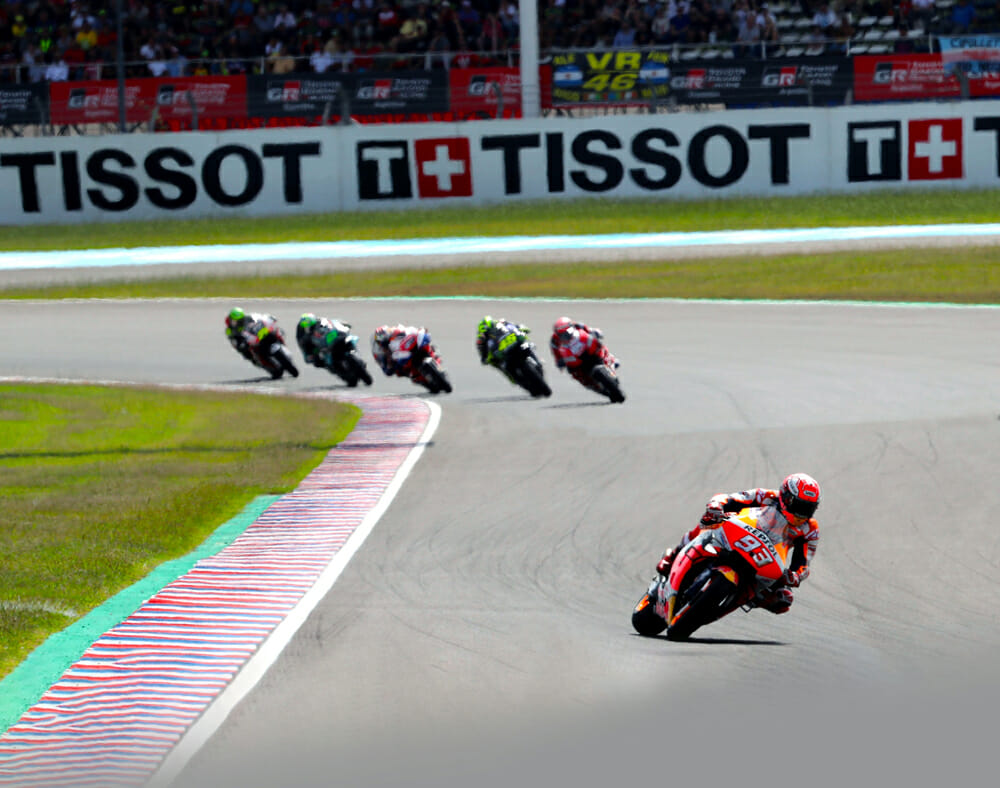
This would prove paramount.
Alzamora, still Marc’s and younger brother Alex’s personal manager, recognized him as not only talented but with an exceptional racing brain.
“When I explained to him things about riding, about how to do the corners, I spoke not with a guy of 12 years, but 25 years,” Alzamora once told me. He put Marc on a fast track to GP racing, with high-level machines and generous financial backing all the way.
Aged 13, he was on a GP-class 125 Honda, impressing in the 2006 and 2007 CEV national Spanish championship, nowadays dubbed the “Junior World Championship.”
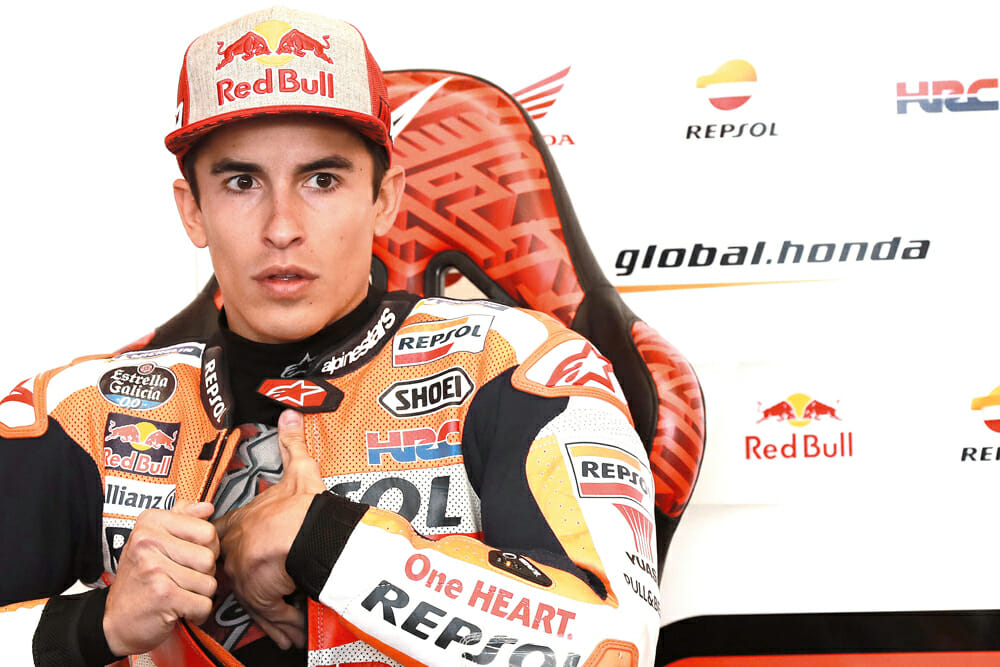
Into GPs in 2008, already backed by Repsol, his first race was round three in Portugal. Riding a KTM, he finished 18th, 51 seconds behind winner Simone Corsi. Current MotoGP riders Takaaki Nakagami, Andrea Iannone and Pol Espargaro were in the same race.
His first points came in the next round, 12th in China; his first podium four races later at a wet Donington Park. He was third, half-a-second adrift of that year’s champion Mike di Meglio, and five behind the winner Scott Redding, whose “youngest-ever GP winner” tag lasted until Can Oncu’s 2018 Valencia GP victory. Like Redding, Marquez was just 15. Today, the minimum age limit has returned to 16.
That was his best result in year one, and he had to wait until 2010 for his first win. But the show was on the road. There would be nine more that year and a first World Championship.
High-level support has meant high-level machines throughout. In Moto2 in 2011, Marquez was the only rider to have direct support and a custom-made chassis from the Suter manufacturer and a handpicked team. He crashed out of the first three races, then won the fourth. By the time they got to round 17 of 18 in Malaysia, he’d won six more and closed to within six points of title leader Stefan Bradl. He looked set for a maiden title win, before a fateful fall on an un-signaled wet patch on his first out lap. It left him with career-threatening double-vision problems that most, fortunately, responded to microsurgical repair.
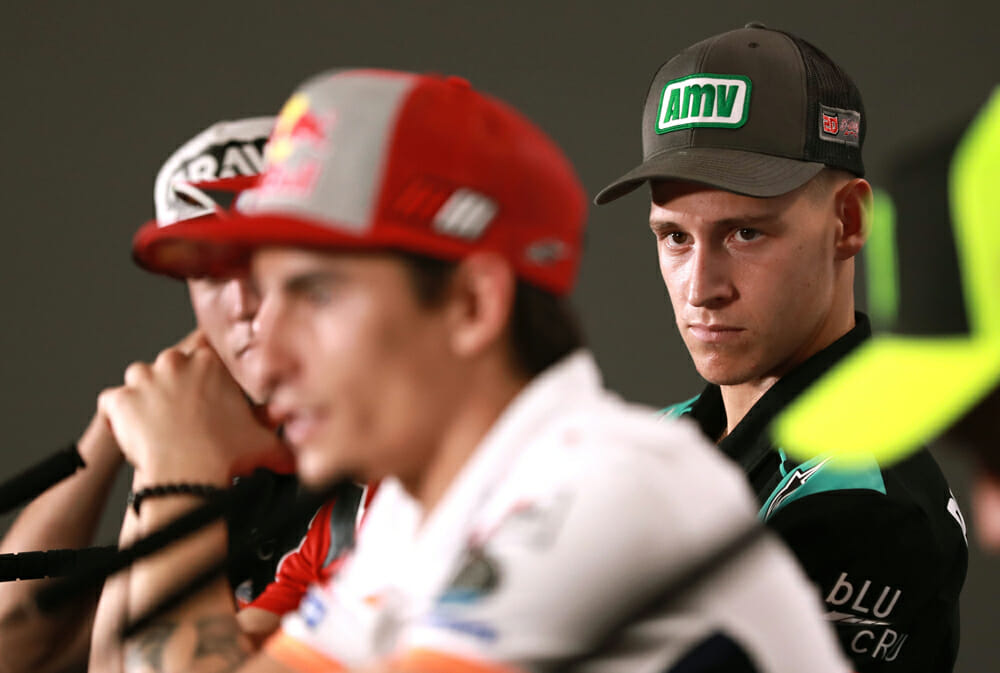
Then it was straight into the factory Honda team in MotoGP for 2013. It doesn’t get much better than that.
This is well-trodden ground.
Everybody knows how Marc’s premier-class career began: the youngest-ever pole qualifier, youngest-ever race winner, youngest-ever champion, and only the second rookie champion (after Kenny Roberts).
Then he did it again in 2014, ’16, ’17, ’18 and now ’19.
This was not his most successful year in terms of race wins. In 2014, there were 14 of them, out of a possible total of 18, or 77.8 percent. This year there were only 12 out of a possible 19—a relatively woeful 63.2 percent. But the more important statistic was proof of a new-found consistency. He never finished lower than second, and this at a time when the potential podium rivals were more numerous both technically and personally.
He achieved a record points score, 395 after 18 races, 420 after the first-ever 19th round in the history of the world championship, and a record points margin over Andrea Dovizioso of 151, which the latter described as “ridiculous.”
Marc kind of agreed.
“It’s not normal,” he said. “In a normal year, you can expect to win five or six races, and the important thing is not to lose too many points where you don’t win.”
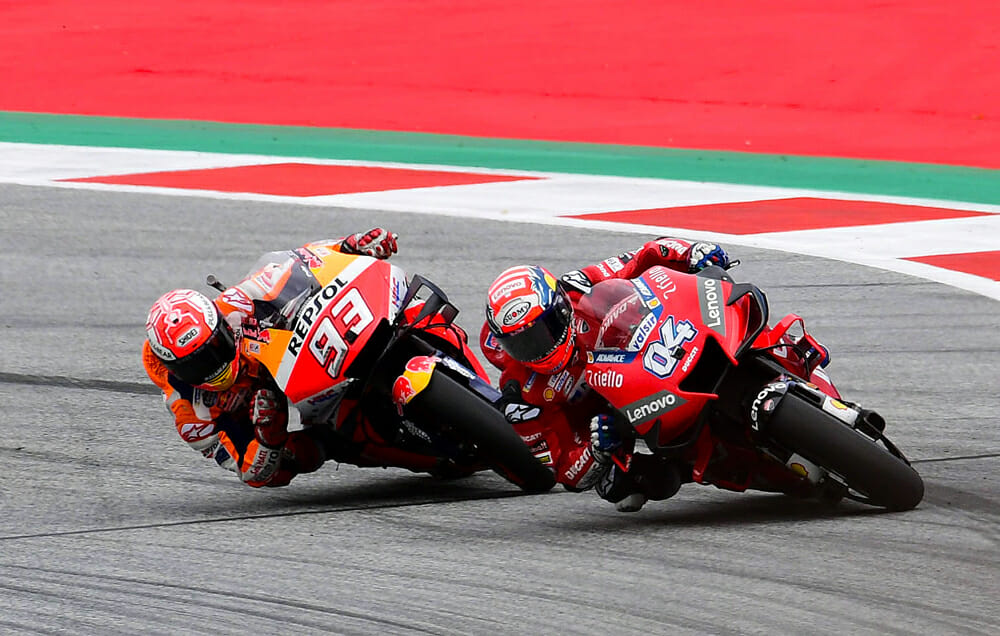
During the year, he frequently spoke of his more mature approach. “I think I am riding better than ever,” and “my goal is not race wins but the championship.” But if he spoke of being ready to accept second when necessary, he seldom gave up the lead without a fight, with some of the closest finishes in history. That was Marc’s way of being careful.
The year was not plain sailing. The 2018 season ended with Marc’s left shoulder so often dislocated that it popped out even when Scott Redding patted him on the back in congratulations after he’d won the title at Motegi, and then again at the final round in Valencia. Major surgery in December left him still recuperating in the early races.
“It was only when we got to Europe that I felt I could ride normally,” he said.
Nor was the bike perfect at first—hence his only non-finish of the year, when he crashed out a massive lead in round three in Texas, triggered after braking for the hairpin at the end of CotA’s long straight. It was caused by a glitch in the engine-braking/throttle-blipping program.
“The engine brake in the first part of the season was a problem, but now they fix,” he said. “HRC has very good engineers. In the first four or five races, we were struggling because it was a new engine, then they fix. It is maybe not the best, but it is constant.”
His personality is sunny, and he accepts adversity easily. That is how he makes it look, anyway. In truth, he never misses an opportunity to stick his fingers in the ribs of his rivals, but he manages to make it look good-natured. Even against Valentino Rossi, his most frequent and vehement attacker.
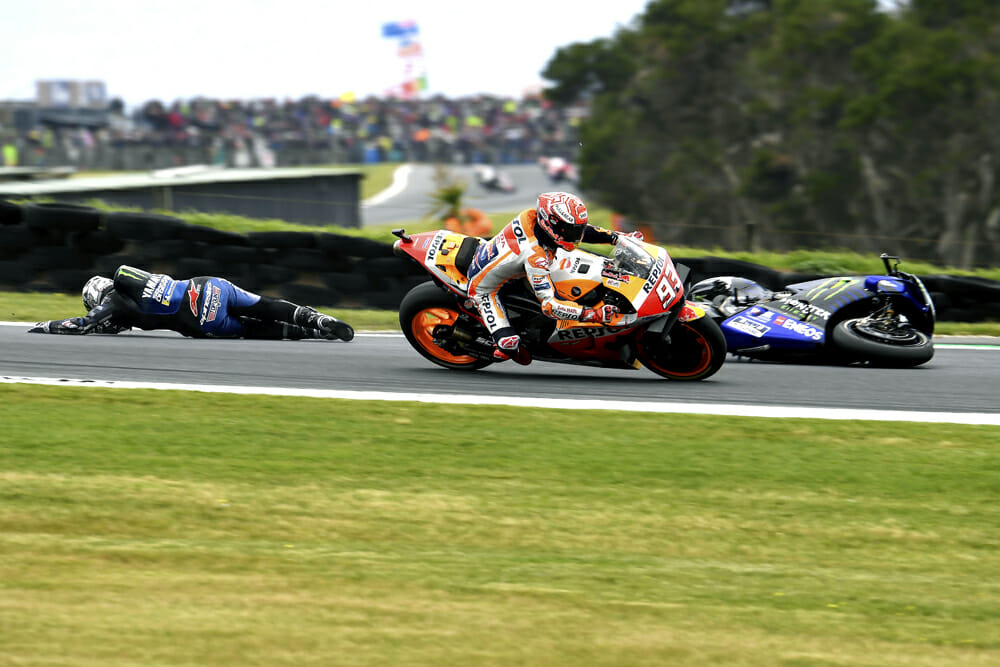
In 2019, there was a new one to rib, and while he started out by flattering Fabio Quartararo’s performances as a way of down-grading those of fellow Yamaha riders Maverick Viñales and Rossi, by the end of the year the groundwork had changed, and perhaps significantly the French rookie had undercut Marquez’s youngest-ever pole record by 47 days.
“I expected Dovi and Maverick,” he said, while sharing the top step with Fabio at the Thailand race where he’d passed him on the last corner, and won the championship. “But I didn’t expect this guy. He was fighting to the end, very tough. Next year he will be a big rider for the championship.” Quartararo’s riding, he said, “reminds me of Lorenzo, when he was at his best.”
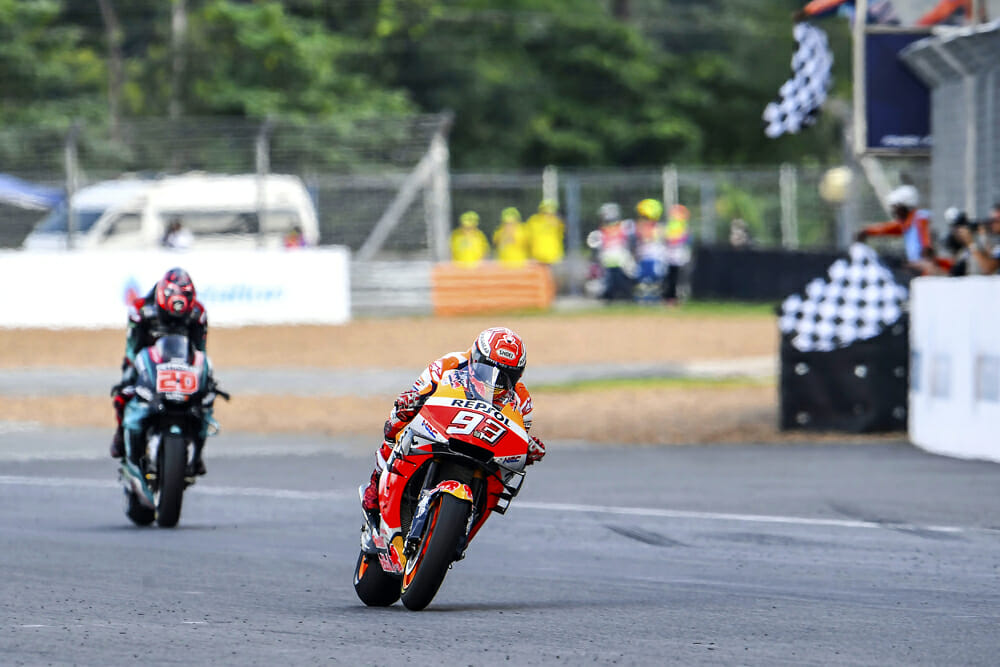
He spoke of a significant effort from Honda but acknowledged that the 2019 bike was not easy to ride. “Not only Lorenzo had trouble, but also sometimes Crutchlow.” His own talent means he can ride around problems.
“You may think it looks easy, but you cannot imagine how I play with my elbows mid-corner, how I play with my body,” he said, but it doesn’t necessarily stand Honda in good stead in developing a bike on which more riders can achieve success.
But if Quartararo will be a bigger threat next year, on a full factory Yamaha which in post-season tests showed a horsepower improvement, there is another more subtle difficulty for him to deal with—sibling power.
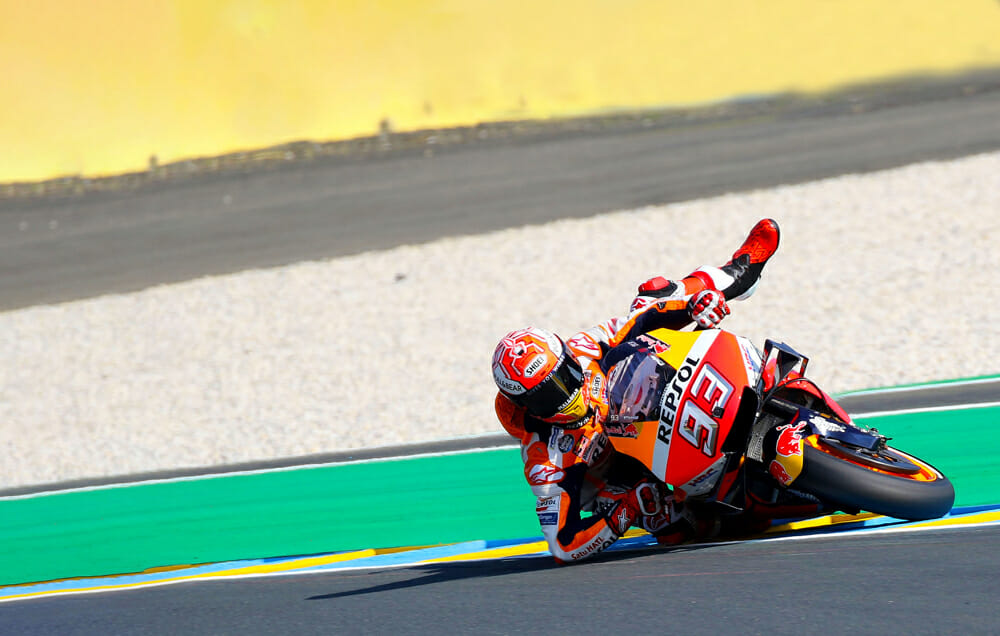
After Jorge Lorenzo’s surprise resignation at the last race of 2019 came another surprise: Repsol Honda plucked his younger brother Alex out of his existing Moto2 contract to put the two side by side in the premier factory team.
Marc believes this will be helpful. The family is close and the brothers very much so, training together pretty much from their earliest memories, and together whenever possible at the track. The only drawback has been a focus on Alex comparing him to Marc. The younger brother narrowly won Moto3 and Moto2 titles, but he hasn’t matched Marc’s stellar progress.
The focus, now they are on the same bike in the same team, will be even more punishingly acute. It will be hard for Alex, and equally so for his older brother.
Marc will doubtless make the most of it and looks set to keep on breaking records. In 2019 he passed Mick Doohan to place third in the list of premier-class winners, with 56 to Agostini’s 68 and Rossi’s 89. In the all-time list, however, there is still work to do. His total of 82 passed Mike Hailwood and is approaching Angel Nieto’s 90, but Rossi (115) and Agostini (122) are likely three or more years away. And nothing lasts forever.
As the previous champions have shown. All have given way in the end, one way or the other.
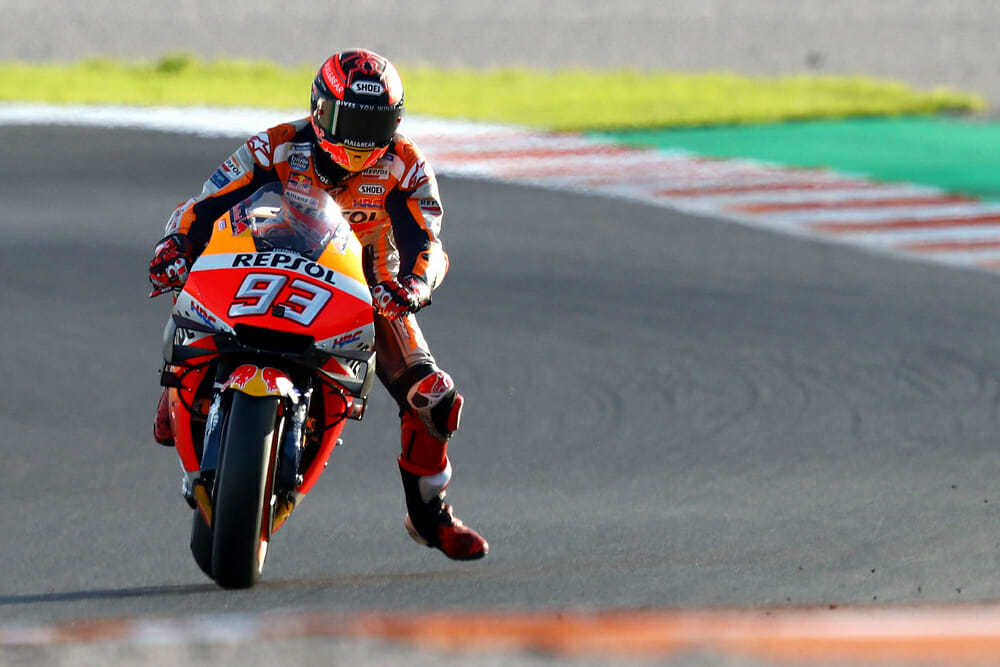
For John Surtees, it was to move to Formula One. For Mike Hailwood, a triple-whammy—Honda’s withdrawal, a state of ennui at winning too much, and (again) the lure of four wheels. For Agostini, it was a surfeit of achievement. For Kenny Roberts, worn-out wrists and a breadth of vision that took him into team management. For Wayne Rainey and Mick Doohan, it was an injury. For Valentino Rossi, just the march of time, though he has so far been unwilling to recognize it.
After seven premier-class years, however, Marc Marquez’s lease on winning, however, seems as fresh as ever. With a growing pile of trophies and statistics, a vaulting bank balance, and an ever-greater army of fans, he keeps on getting better.
As if that were possible.CN
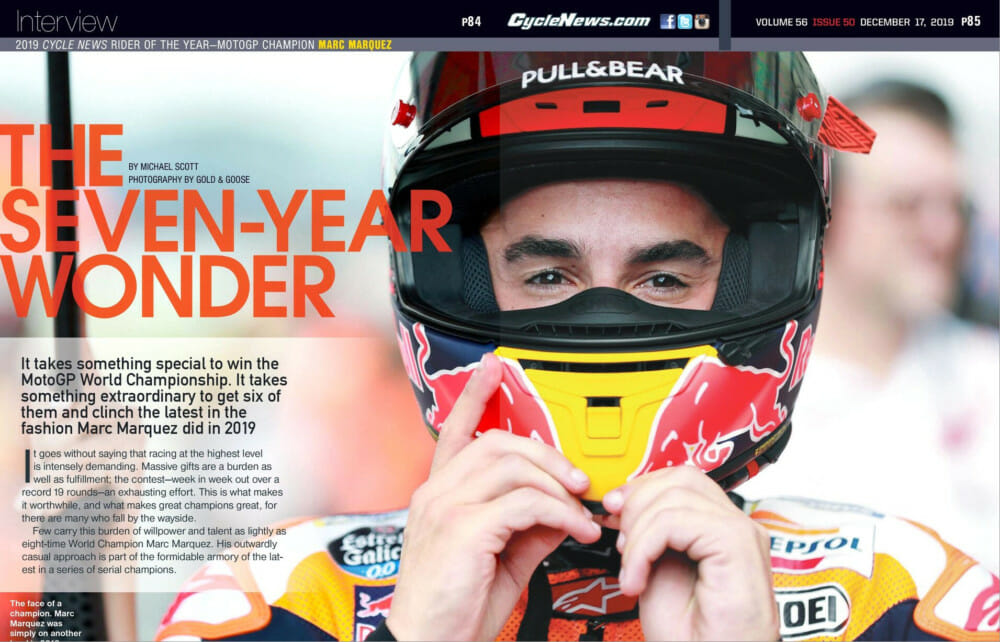
Click here to read this in the Cycle News Digital Edition Magazine.
Click here for all the latest motorcycle Industry News on Cycle News.
Click here for all the latest MotoGP news.
"cycle" - Google News
January 01, 2020 at 02:44AM
https://ift.tt/39wGIeq
2019 Cycle News Rider of The Year—MotoGP Champion Marc Marquez - Cycle News
"cycle" - Google News
https://ift.tt/32MWqxP
Shoes Man Tutorial
Pos News Update
Meme Update
Korean Entertainment News
Japan News Update
Bagikan Berita Ini















0 Response to "2019 Cycle News Rider of The Year—MotoGP Champion Marc Marquez - Cycle News"
Post a Comment